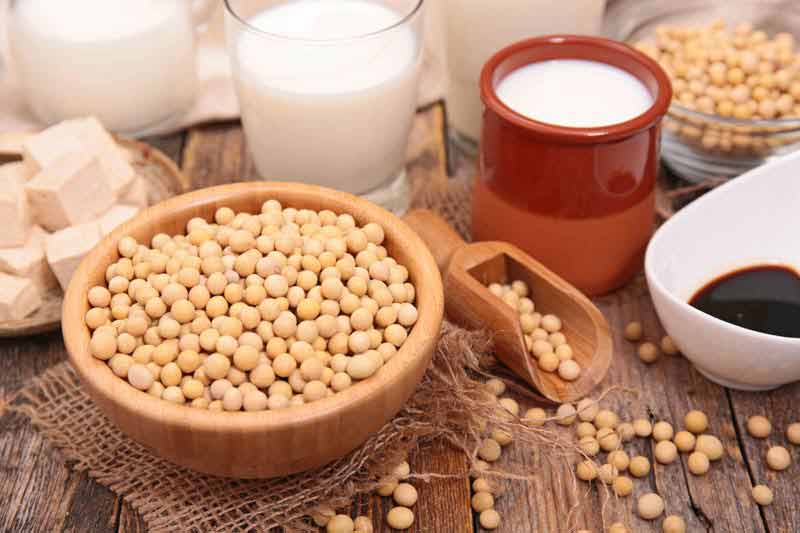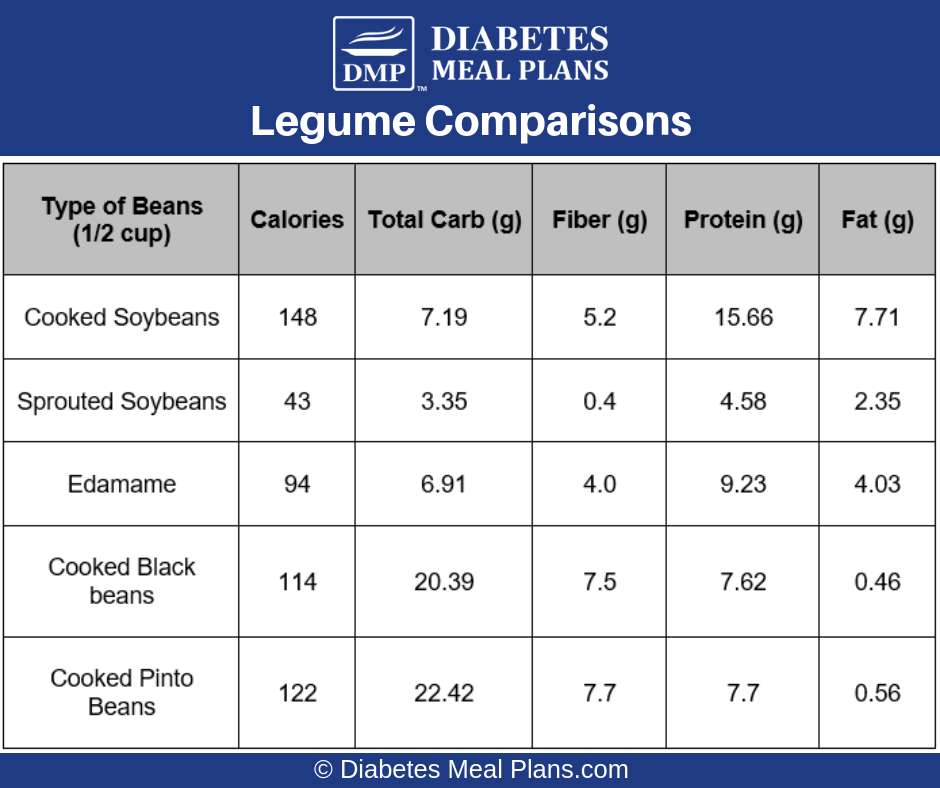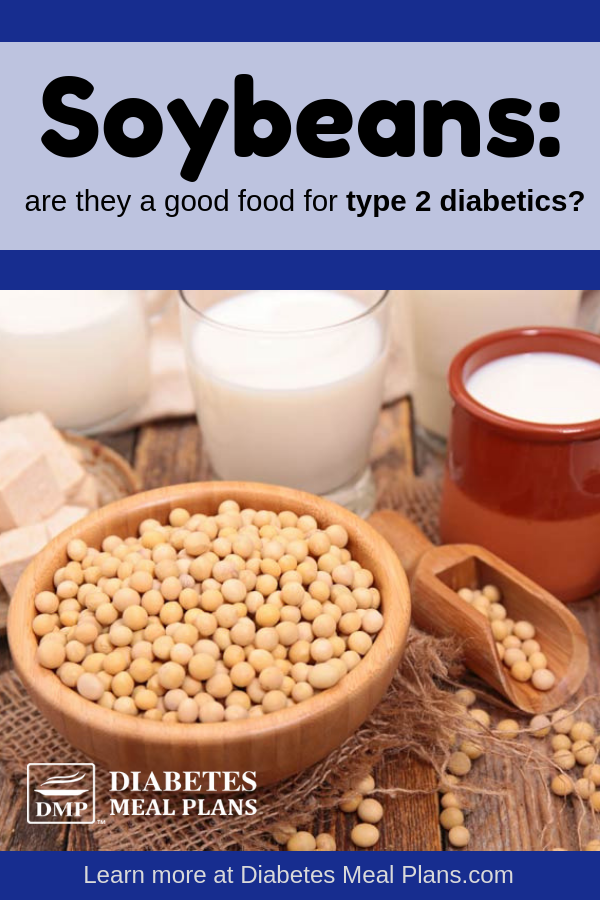Soy products are everywhere these days. And they do provide a vegetarian protein source, regardless of whether you’re vegan or vegetarian.
From soy milk to classic tofu, it’s hard to keep away from soy-based foods as they are convenient, versatile, and growing in popularity. But do soybeans and diabetes make a good match? Are they healthy for blood glucose levels?
This really depends on which soy products you choose. Some soy foods are a great addition to a well-rounded, low-carb diet and others are best left on the shelf.
Keep reading to find out which soy foods to love and which ones to leave behind!

What are Soybeans?
Soybeans are a member of the legume family alongside peas, beans, and peanuts. Although they were originally grown in East Asia, soybeans are now produced all around the world and many different cultures value them for the hearty protein they provide.
It’s likely that you may see quite a few soy-based products when strolling through the grocery store. From plain soybeans to plant-based meat and dairy alternatives like tofu and soy milk, soy products are everywhere these days. And interestingly, soy flour and other soy derivatives are found in many other packaged food products.
Soybean Nutrition Facts
There are three basic ways to enjoy soybeans.
You can fully cook mature soybeans by boiling them, you can eat sprouted soybeans raw, or you can lightly steam a bowl of edamame (these are immature soybeans still inside the pod).
Between these three options you can easily work soybeans into a variety of main or side dishes, but their versatility isn’t the biggest reason to put soybeans on your next shopping list.
The real reason to love soybeans is their high level of nutrition.
They contain an ample amount of both protein and dietary fiber; two nutrients that help stabilize your blood sugar throughout the day.
On top of that, soybeans contain a healthy dose of saturated fat and unsaturated fats as well as micronutrients like potassium, iron, calcium, phosphorus, and vitamin K.
Another huge selling point for soybeans is that they are lower in carbohydrates than most other beans.
Comparing Soybeans to Other Legumes
You may already know that a eating fewer carbs is rule to live by when you’re treating type 2 diabetes with diet and lifestyle changes.
Often, following this rule means cutting down on the amount of beans and legumes in your diet because a lot of them are not low carb foods.
Luckily, soybeans are an exception to this rule.
A quick glance over this comparison chart will show you why all three types of soybeans are superior to both black beans and pinto beans in terms of carbohydrates.

A half cup serving of cooked soybeans contains only 7.19 g of carbs while a serving of cooked pinto beans contains a massive 22.42 g of carbs.
Further, that serving of cooked soybeans has two times more protein than the serving of pinto beans does.
And to top it off, the soybeans are naturally higher in fat than either pinto beans or black beans. Remember that fat is a vital part of a healthy diet and it is a great blood sugar stabilizer, too!
What About Other Soybean Products?
As you read earlier, soybeans can be made into a variety of food products, most of which are fine for people with diabetes to enjoy.
Miso, unsweetened soy milk, and soy sauce are all acceptable inclusions. Just look for the least processed versions of these products and make sure that any soy milk you drink is unsweetened.
A cup of sweetened soy milk can pack up to 16 g of added sugar, while a cup of unsweetened soy milk usually contains 1 g or less.
Tofu and tempeh (a type of fermented soy) are hearty protein sources if you are following a vegetarian diet and you can also add them into a non-vegetarian diet for a little variety.
Soy protein such as TVP, also known as textured vegetable protein, makes a great substitute for ground beef in pasta sauces and ‘meat’ patties.
Soy products like soy chips, soy oil, and soy flour, however, are more processed, can be higher in carbs, and can be high in inflammatory omega-6 fatty acids, so steer clear of these!
Fermented Soy
Fermented soy is considered one of the healthiest ways to consume soy as it contains small bioactive peptides, with research showing improvements in insulin resistance, insulin production and improved blood sugar control.
Fermented soy products include:
- miso
- soy sauce/ tamari
- natto
- tempeh

Research on Soybeans and Diabetes
Reduced risk of type 2 diabetes
Nutrition research shows the consumption of soy foods has been associated with a reduced risk of developing type 2 diabetes, according to a 2018 review. In addition reducing your risk of diabetes, the natural chemicals found in soy can also help those already living with type 2 diabetes and may reduce risk of diabetic complications.
Cardiovascular health
Soybeans are rich in isoflavones, a type of phytoestrogen that has been shown to have beneficial effects for cardiovascular health. Since type 2 diabetics are at a higher risk for heart disease than the general population is, managing your cholesterol levels and controlling inflammation is essential.
A 2007 meta-analysis found that soy isoflavones significantly decreased total cholesterol by 0.10 mmol/L and decreased LDL cholesterol by 0.13 mmol/L while no significant changes to HDL (“good”) cholesterol occurred. They also found that the subjects with high cholesterol experienced greater reductions in LDL cholesterol than subjects with healthy cholesterol levels did.
A 2017 review found that the phytochemicals in soy products contributed to lower cholesterol, lower blood pressure, and reduced inflammation, as well as lower blood sugar levels among diabetic subjects.
Blood glucose and insulin
A 2013 study of 120 women with metabolic syndrome found that the women who received a soy isoflavone supplement (genistein) for a year had significantly lower fasting blood glucose levels, lower fasting insulin, and lower HOMA-IR levels (insulin resistance) than women in the placebo group did. The isoflavone supplement also decreased triglycerides and levels of LDL cholesterol (from 108.8 to 78.7 mg/dL).
Another study (2015) found that women with metabolic syndrome who were placed on a therapeutic life changes (TLC) diet, which included 0.5 cups of soy nuts daily, had significant reductions in diastolic blood pressure (-7.7%), triglycerides (-22.9%), and C-reactive protein (-21.4%) compared to those who followed the TLC diet without soy nuts.
Inflammation
Research from 2011 and 2013 found that the consumption of concentrated soy isoflavones resulted in a modest reduction in inflammation markers like C-reactive protein (-0.17 mg/L) and interleukin-6 among women over the age of 60.
In a randomized control trial of 75 people with type 2 diabetes, the researchers compared consumption of soybeans (1 cup cooked 3 times per week) to legumes and red meat. The results showed those consuming the soy had lower inflammatory markers.
When researchers tested the effects of the active compound in soy, daidzein, on cell cultures they found it suppressed the activation of inflammatory mediators. Daidzein is greater in fermented soy products.
What about Female Hormone Estrogens?
Some people worry about the effects of soy because of the phytoestrogens. Research shows both benefits and potential precautions attached to phytoestrogens.
It is possible that the phytoestrogens can bind to cells and lead to potential hormone disruption, as has been shown in many animal studies. This may have a particular effect on things like lactation, reproduction, fertility, and sex specific behavior.
There is some speculation that soy isoflavones can be disruptive to the female reproductive health, as it suppresses circulating estrogens and progesterone levels. Caution in eating soy should be taken for women attempting to become pregnant or experiencing menstrual cycle irregularities or hormonal upsets. And for those with thyroid issues, soy may be best avoided.
One plausible reason for this is people’s higher exposure to soy in the food supply. Soy derivatives are put into approximately 60% of processed foods. Interestingly, studies in Asian populations show that soy is generally beneficial. So, in a whole foods diet, the consumption of soy may have a different effect, it is unclear.
As for type 2 diabetes, there are no studies that indicate phytoestrogens are an issue. But if you are concerned, then it is your choice to avoid soy. Or alternatively stick to fermented soy products.
Conclusion
Soybeans can serve as a great protein staple in vegetarian diets and they are a fun way to add variety to diets that already include meat.
In general soybeans are rich in protein, healthy fats, fiber, and micronutrients, plus they are lower in carbs than other beans and legumes. Young soybeans (edamame) are the lowest carb option.
In terms of health, they may help with glucose control, insulin sensitivity, inflammation, decreased risk of cardiovascular disease, particularly fermented soybean products such as miso, tempeh, natto, and soy sauce.

Luella Myles
This was some valuable, helpful, and very enlightening information; I much appreciated reading, and learning more about higher protein foods, especially in regard to blood glucose sugar, and the impact of not adding enough high protein foods to one’s diet. Thank you kindly!
Dr Jedha
Glad you found it helpful Luella!
Victor Kuma
Although am a diabetic patient but under control because consuming medications and controlling with the foods too, so
my average sugar level was around 130 to 140, however yesterday my dinner was fried Soya Beans and today morning
when I check the sugar level is 180 . So am confused whether the soya Bean is good or bad for diabetic patient like my
condition.
Dr Jedha
Hi Victor, well you can certainly say it was something in the meal you ate. Beans and legumes can be higher in carbs than other foods, so small portions is key. Soybeans are fine to eat, but again, small portions may be key. Also consider if there were any other hidden sources of carbs in your meal that may have caused blood sugar to rise.